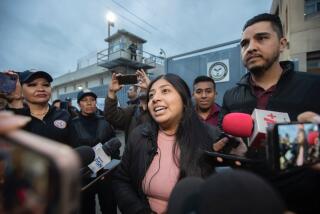Victim’s Mother Barred From Murder Trial
- Share via
Ordering the mother of a murder victim to stay away from the trial is “degrading and morally offensive,” representatives of four victims rights groups said Tuesday.
The unusual protest and legal tussle developed in the San Fernando Superior Court trial of Jeanie Adair, who is accused of killing her husband.
Judge L. Jeffrey Wiatt banned the victim’s mother, Margarita Ruffino, after a hearing last week in which Adair said Ruffino had threatened her in a courthouse restroom.
Wiatt was wrong, said representatives of Justice for Homicide Victims, Doris Tate Crime Victims Bureau, Crime Victims United and L.A. Coalition of Crime Victim Advocates.
The advocates, who attended the trial Tuesday, said Wiatt violated the state’s “Victims’ Bill of Rights” statute that gives victims and their families the right to be present at trial.
But state law also gives judges wide discretion to control courtrooms, including ejecting members of the audience. Judges can take “overriding interests” into account, such as a defendant’s right to a fair trial.
Wiatt had the legal authority to bar Ruffino, said Jerrianne Hayslett, spokeswoman for the court.
Laurie Levenson, a Loyola Law School professor who specializes in criminal law, agreed.
“Everyone needs to be sensitive to the victims and their right to be present, but the courtroom is not a stadium--you can’t jeer and you can’t cheer,” Levenson said. “The judge has the bottom-line obligation to ensure the defendant’s right to a fair trial.”
Adair, 39, is charged with killing her husband, Robert, 40, with a baseball bat in their Sylmar condominium in 1996.
Last Thursday, Adair told her lawyer, Richard Plotin, that her former mother-in-law had cornered her in a restroom.
Plotin told Wiatt about the alleged incident. But Deputy Dist. Atty. Marsh Goldstein told the judge that Ruffino denied that any words were exchanged.
Wiatt then ordered Ruffino to stay 500 yards away from the courthouse.
At a hearing Friday requested by the prosecutor, Adair told Wiatt that Ruffino whispered, “You’re going to burn” when the two met in the first-floor restroom.
“I knew I had to get out of the bathroom,” she said. “I was scared.”
During questioning by Plotin, Ruffino denied making the remark.
“As God is my witness, never,” said Ruffino, who had to be helped to and from the witness stand by her sons. “Forget about talking to her, I didn’t look at her, Mr. Plotin.”
She said she would never have jeopardized her attendance at this trial, which she said she has been awaiting for three years.
“She has engendered a fear in my client by what she’s done,” fumed Plotin.
“To exclude the victim’s mother as a remedy is draconian, to say the least,” argued Goldstein, who asked the judge instead to order her to stay away from Adair.
But Wiatt said he could not risk the jury seeing an exchange between Ruffino and the defendant, which he said would endanger Adair’s right to a fair trial. He added that Ruffino had been making faces in the courtroom.
Levenson, the law professor, said the combination of the restroom incident and the courtroom behavior created reasonable grounds for excluding Ruffino.
The victims’ advocates remained outraged, especially since Wiatt banned Ruffino without giving her a second chance, as judges also have discretion to do.
“This is the mother of the victim. She certainly has the right to be present to make sure justice is dealt fairly,” said Jackie Ravel Knezevich, founder of the L.A. Coalition. “Now she’ll never know.”
More to Read
Sign up for Essential California
The most important California stories and recommendations in your inbox every morning.
You may occasionally receive promotional content from the Los Angeles Times.












